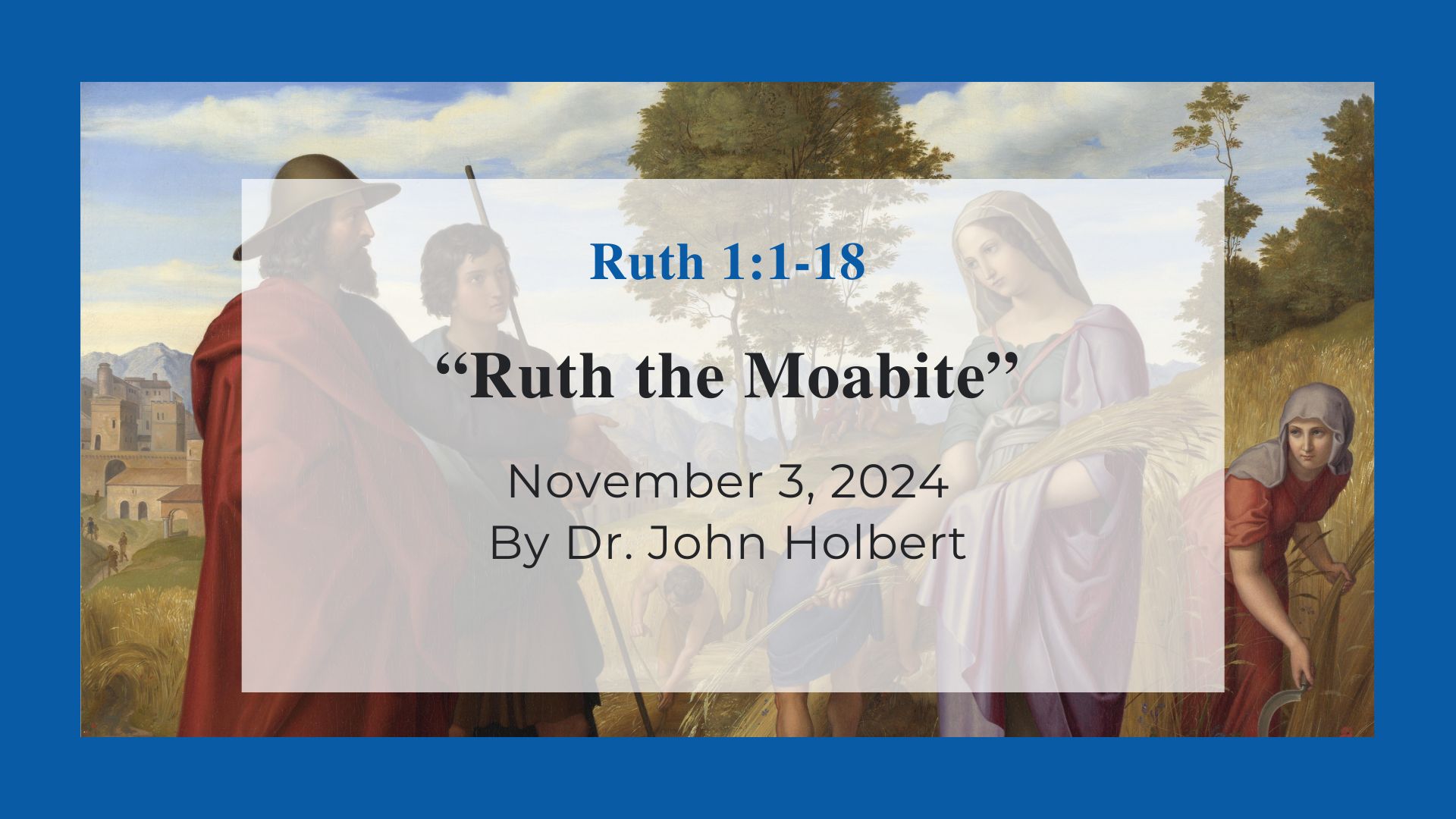Ruth the Moabite - Reflections in Ruth 1:1-18, Proper 26 Year B
by John Holbert on Monday, October 28, 2024

Proper 26. November 3, 2024. Ruth 1:1-18. “Ruth the Moabite”
Certain biblical books cannot be addressed faithfully until the entire story is known. Ruth is surely one of those books. Without the end of the story in chapter 4, chapter 1 could be seen as an isolated event, disconnected from the full flavor of the narrative. However, having said that, it will be clear that the character of Ruth will be well presented to us in this opening portion, without which we cannot see just how crucial it is to witness the astonishing Ruth in action as the tale evolves. In numerous ways, the fact of Ruth’s superb person will be evident as she maneuvers between the tragedies of death and emigration from her homeland to the amazing commitment she demonstrates to her downcast mother-in-law, Naomi.
The story is subtly presented from the start. It is set in the time of the Judges (Ruth 1:1), that brutal age in Israel’s history that might be categorized as crazy, murderous, and lusty, rife with dead bodies and mayhem. If that is the age of Ruth’s story, we might expect another corpse to appear soon, but this will not be such a story. The tale also begins with famine, a common enough occurence in the Middle East, yet the city that is central is Bethlehem, meaning in Hebrew “house of food.” And a family is on the move, leaving a foodless place for Moab, a tiny country east of Bethlehem, but higher in elevation across the Dead Sea. Perhaps they might find food there.
But tragedy soon strikes. Husband Elimelech dies, and after marrying two Moabite women, both the family’s sons also die, leaving only three women alive, Naomi and her two Moabite daughters-in-law, Orpah (yes, Oprah Winfrey got her name from a misspelling of that girl’s name) and Ruth. They live in Moab, the three of them, for ten years. But Naomi hears that the famine may be over in Israel, so she heads back there; after all, it is her home. At first, her daughters-in-law go with her on the Bethlehem road, but Naomi is having none of that.
“Go back each of you to your mother’s house. May YHWH deal well with you, just as you have dealt well with the dead and with me. YHWH grant that you find rest (safety, security) each of you in the house of your (Moabite) husband” (Ruth 1:8-9). Naomi knows all too well the possible fate of two Moabite widows in Israel. First, they are women, and thus automatically second-class people. Second, they are widows, and are thus seen as potential wards of the state, having no connection to a man. Third, they are foreigners, and Moabites to boot. Moabites have at best a checkered history in Israel. They were in a near continuous struggle with Israel for desert land, as the famous Moabite stone, a 9th century monument from a king named Mesha, makes plain. And then there is that repulsive story of Sodom and Gemorrah, where Lot and his two daughters escape the doomed cities, wind up in a cave together, whereupon the two girls engage in sex with their father, and give birth to sons, named Amon and Moab (Gen.19:30-38). Hence, the very name of the Moabites derives from incest, hardly a ringing endorsement.
The girls, however, refuse to abandon their mother-in-law. But then Naomi adds the kicker. Why go with me? Do I have sons in my womb that could become your husbands? Even if a man came down the road right now, and he made me pregnant, would you wait until those sons had grown? Absurd! You would be old and alone, as I will be. “No, it is far more bitter for me than for you; the hand of YHWH has turned against me!” (Ruth 1:13). Orpah gets the point, and turns to heads back to Moab. “But Ruth clung to her” (Ruth 1:14). The verb, “clung,” is the same one used in Genesis to describe how a man leaves father and mother and “clings” to his wife (Gen.2:24).
And Naomi is astonished. Did you not hear me, woman! Join your sister and leave me alone. And then Ruth utters one of the great speeches of the Bible, often used at weddings even today. But that is not the best context of the speech. Ruth is now pledging that she will never leave Naomi, will live with her and die with her in her land, rather than her own. Even death will not part the two of them, she adds, and in the face of that speech, Naomi is struck silent (Ruth 1:18).
But there is more. As the two of them enter Bethlehem, Naomi is recognized and named. But she says, “Do not call me Naomi (“pleasant” in Hebrew), rather call me Marah (bitter), because Shaddai has dealt bitterly with me. I went away full, but YHWH has brought me back empty” (Ruth 1:20-21). Empty? Really? What about that wonderful Moabite standing so near? If Ruth were not Ruth, she would have caught the next bus back to Moab. But not Ruth. She will now give all of herself to the care and maintenance of her mother-in-law, despite Naomi’s initial lack of recognition of that fact. Only at the very end of the story, will Naomi join us in celebrating the wonder of Ruth.
